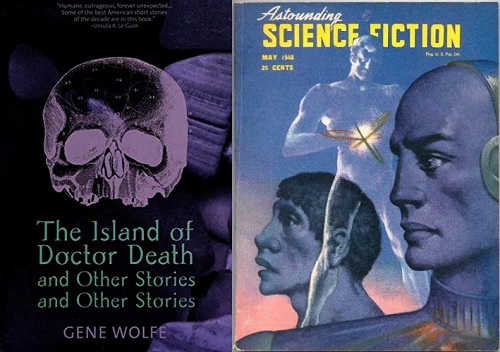Munchie and The Bearman invited me on to their Spotify podcast What's Your Issue? to talk about my blog and competing conceptions of what SF should be; click the link below to listen to me spend an hour learning how to use a microphone and struggling to remember the name of my favorite Gene Wolfe story.
https://open.spotify.com/
NB: In this podcast I recommend not only Gene Wolfe's 1978 "The Doctor of Death Island," which made its debut in Jack Dann's Immortal and would be reprinted in The Island of Doctor Death and Other Stories and Other Stories, but the original magazine version of A. E. van Vogt's "The Rull." Click this link to be transported to the May 1948 issue of Astounding wherein the MPorcius-approved version of "The Rull" can be found, and accept no substitutes!
[UPDATE OCTOBER 6, 2022: Munchie tells me the episode in which I appeared is now one of their most listened-to; thanks to everybody who tuned in, and if you haven't yet and are curious to hear me tell the origin story of MPorcius Fiction Log and talk about John W. Campbell, Jr. and Barry N. Malzberg, or hear what Munchie has to say about Star Trek and The Bearman's take on recent marvel movies, check it out at the link above!]


Hi MPorcius, just finished listening to the podcast, very interesting and you came across as confident and thoughtful. I agree in particular about the current popularity of SF (I include superhero movies and comics in this) vs. the earlier fringe nature of the genre; when it was nerdy it was I think more daring and willing to take risks, now because of its control by massive companies which won't risk their capital, SF has been made "safe" - it's at pains to not offend anyone and so rarely challenges us to view our lives from a different perspective. But, as an art teacher colleague once told me, the function of art should be to disturb the viewer and make them uncomfortable, to challenge their assumptions.
ReplyDeleteThanks! Munchie and The Bearman were generous and made it easy for me to try to get things across, even while at the same time asking me questions I wasn't quite ready for so I had to think on my feet!
DeleteYou make a good point about how products that want to reach a broad audience sort of have to be less challenging as part of their business model, but that so much great art is challenging. It is easy to think of lots of examples of 20th-century SF that was deliberately challenging and provocative; Campbell very deliberately published such material, and then Harlan Ellison did that with Dangerous Visions; what could be more challenging and provocative than Theodore Sturgeon's "If All Men Were Brothers, Would You Let One Marry Your Sister?", a story suggesting all our social and political problems can be traced to the incest taboo!
I think it is also interesting to note that while on the podcast I talked about the dispute between Campbell and Malzberg, that Malzberg admired Campbell and actually thought that his own fiction, that suggested the space program was doomed to failure just like other large institutional efforts (like the public welfare programs he satirizes in books like The Horizontal Woman and Screen) were actually in the Campbellian tradition of challenging people's ideas and trying to get them to think.
Another thing I might have added on the podcast has to do with my suggestion that people like post-apocalyptic scenarios because they offer a chance to rebuild society without first shouldering the moral responsibility of destroying the current society. On the podcast we sort of focused on left-wingers doing this, but of course people who aren't lefties do the same--Ray Bradbury ends Fahrenheit 451 with an atomic war that sweeps away the tyrannical society and opens up a chance for the book-loving people to build a better society, and L. Ron Hubbard in 1940's Final Blackout has a guy build a utopia after Europe has been destroyed and there are plenty of other examples.